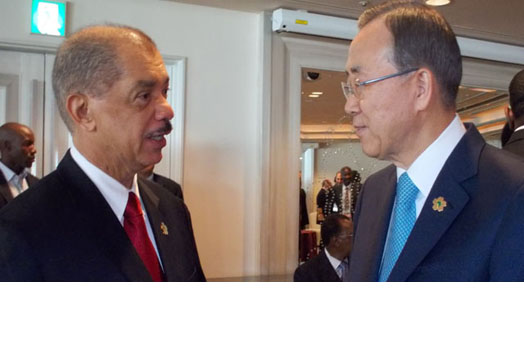
The Tokyo International Conference on African Development (TICAD V) that took place in Yokohama, Japan, from 1st to 3rd June, has ended with a resounding round of applause as participants adopted the 2013 Yokohama Declaration and Action Plan.
Following the conclusion of the conference, President Michel has hailed the TICAD V a success, especially as many countries of Africa have echoed Seychelles to promote the importance of the blue economy.
“I am very encouraged by the outcome of the conference. I feel we have their support. They realize the importance of the resources of our oceans; the need to take ownership of them and at the same time to protect them, for the benefit of future generations…. In Yokohama, this concept has been much discussed, and it will be developed in the future. Japan has also expressed its support for African ownership of its resources, and its economic future, and this kind of partnership is vital for African renaissance,” said President Michel.
During the opening session of the Conference for instance, Dr. Nkosazana Dlamini-Zuma, Chairperson of the African Union Commission, sought to highlight the importance of Africa’s oceans. She pointed out that Africa has long coastlines, both around the mainland and its island states. She added that Africa should work together with Japan on issues of the blue economy, and that this is particularly critical for small island states.
Another island country highlighting the significance of Africa’s oceans was Sao Tome and Principe, which reaffirmed the need to secure maritime trading routes from scourges such as piracy, as well as place the maritime sector at the heart of African development.
The Secretary General of the International Maritime Organization, Mr. Koji Sekimizu, also called on African nations to give greater attention to sustainable maritime development in the post-2015 development period. He emphasized the importance of training Africa’s future maritime experts and promoting maritime-related businesses.
The President said that he was also encouraged by the level of support of the participating countries of TICAD that had been expressed towards the establishment of peace and security in Somalia, in order to bring about law and order in the country.
Also relating to the realization of greater peace and stability across the region, delegates highlighted the danger of persisting cross-border threats such as terrorism, smuggling of arms and narcotics, and maritime piracy – and underscored that Africa must confront these challenges together with the help of international partners such as Japan.
Prime Minister Ramgoolam of the Republic of Mauritius also spoke alongside President Michel on the issue of maritime piracy, reiterating the need for shared efforts.
Other key issues that were discussed throughout the Conference included the importance of resilient and inclusive growth. Adaption and mitigation strategies against climate change were emphasized as being crucial for Africa’s development, given its particular vulnerability to its hazardous effects. The promotion of the private sector was also identified as being crucial for economic prosperity, with a particular need to provide greater opportunities for women and the youth.
The adopted 2013 Yokohama Action Plan seeks to address such issues via a myriad of means, backed by USD 32 billion package from Japan, which it plans to distribute over the next 5 years.
The Minister for Foreign Affairs, Jean-Paul Adam said that Seychelles had received support during the TICAD for greater attention to be given to the needs of the island states of Africa, in terms of climate change mitigation as well as security and economic development specificities.
“Seychelles benefits a great deal from the TICAD process, as it reinforces cooperation with Japan as well as raising awareness of the collective needs of Africa’s development. We have been successful in using the TICAD mechanism to raise awareness on the need for greater maritime security as well as garnering support for developing our marine resources,” said Minister Jean-Paul Adam.
The Minister added that island states can also use Japan as a model for maritime development, and use the resources and technical assistance of the TICAD process to mirror the Japanese port and trade developments, which have made it the world’s third largest economy and one of the strongest trading powers of the world.
The TICAD V Summit was attended by over 30 Heads of State, and was co-organized by the Government of Japan, AUC, UN Office, UNDP, and the World Bank.